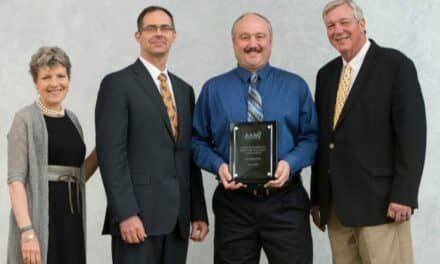
Chris Gaerig
With more than 20 years in the talent acquisition industry, Jenifer Brown, president and owner of the newly founded Health Tech Talent Management LLC, Virginia Beach, Va, knows what it takes to find the right candidate for the right employer. With most of her time spent dedicated to the health care industry, Brown has not only become familiar with a large portion of the industry, but she also has a unique perspective on where the industry has been, where it is currently, and where it is headed. Looking to take on a larger role in the industry, Brown began Health Tech Talent Management LLC to further assist both employers and potential employees achieve their ultimate goal: quality patient care. 24×7 recently sat down with Brown to talk about starting a new company, the services she offers to biomeds, and the status of the clinical engineering field.
24×7: Why did you decide to form your own company?
Brown: I had been with Aramark covering it on a national level and thought that I was ready for a bigger challenge. I had been thinking about opening my own business for the last couple of years and decided that now was the time. There is so much change going on in health care today with the new reform and regulations, and I felt like there was a lot of need out there. I felt like I could assist the industry on a broader scale by owning my own business. I just opened it up on March 19, and I have been bombarded. It’s been fantastic. I feel like I made the right decision.
24×7: What is the company’s mission?
Brown: My goal is to really be the solution provider that this industry comes to for talent. Be it hospital systems, an OEM, or service organizations, I do know and understand the medical equipment service industry as well as almost everyone in the industry.
I do full-cycle offerings, which makes my service kind of unique. For the employers, I do everything from position calibrations to full screening on the candidates. I provide references, and assist through the interview and hiring process. Then for the candidates, I help perfect their resume, give career advisement, and help with the interview and hiring process. I do the full cycle on both sides—both candidate and employer perspective. I also do consulting, seminars, and training.
24×7: How has the company grown since its inception?
Brown: I just started it and I had a large response from candidates, but also I’ve had a lot of employers express interest. Several of them have already gone to contract this week. I think that’s great within a short time.
Since I opened the doors, it’s probably been 60/40 candidates to employers. Employers are interested and are looking for me to be their solution provider, as well as candidates.
24×7: Did you encounter any struggles when starting your own company?
Brown: No. I’ve owned my own business before. I was a marketing director for an employment agency before. I know the industry and I know how to run a business, but it had been a while since I had opened one. Just getting all of the logistics together—the legal aspect, the marketing aspect—I took 4 weeks to make sure that I had everything just the way I wanted it. I think the difficulty was trying to figure out the best way to manage my time and where to focus my time. I’m still always working on that to get the best return on investment.

Jenifer Brown
A Quick Take
24×7: What is your history in the health care talent acquisition industry?
Brown: I have probably a total of 22 years in talent acquisiton and placement in all industries. The last 17 years I really just focused on the medical equipment service industry.
24×7: What is your history in the health care talent acquisition industry?
Brown: I have probably a total of 22 years in talent acquisiton and placement in all industries. The last 17 years I really just focused on the medical equipment service industry.
24×7: What are some of the services you offer to employers?
Brown: For employers, my main service would be—which can be customized—the talent search and acquisition. I assist them with their needs for permanent placement. As I said, I provide service through the whole cycle. I do a calibration meeting with the client, as well as full screening and references on the candidates, throughout the whole interviewing process and even until they’re on board. So I do full-cycle service.
I don’t know how many other agencies do that, but I know a lot of them don’t do the full cycle; they do pieces. I feel that I’d rather make sure that I’m really hitting on target with what the employers are looking for, and then really spending quality time not just searching for those candidates but also screening those candidates. That way, I’m providing a higher quality of candidate flow.
I know right now, with all the different acquisitions and mergers, that employers may have temporary talent needs to help them during a transition. Although it’s not my main service, I can assist with temporary talent.
24×7: Do you provide other services to employers?
Brown: I also do consulting for employers. I can actually come in and help a hospital, for example, not have as many vendor service contracts. If they want to build that talent, I can consult with them on how to do that. If they want to have me come in and train their team to be a strong team and retain the talent, I offer that too. I have all different kinds of training. I can also help with workforce planning and succession planning.
24×7: What are some of the services you offer to candidates?
Brown: For candidates, again I do full-cycle service. I know through talking to the candidates and from all of my years in the industry that they don’t always get the full-cycle service, but I want to make sure that they have that. For example, the candidates I’m already working with were thrilled to have me tweak their resumes. They were thrilled to have me give them advice on what they really need in their “box of tools” to go to the next step. A lot of them, though they have the desire, don’t know how to get from point A to point B. They don’t know how to present themselves, whether it’s their resume, interviewing, or whatever the case is. I do the full cycle, and consequently—it’s a small industry, and everyone knows everyone—I’ve already gotten referrals from the candidates. It all pays off.
24×7: How has the health care talent acquisition industry changed over the last several years?
Brown: I feel that some of the skill sets for candidates to have are different. Consequently, the levels of candidates I look for have changed. Because it’s changing so constantly, the old way of thinking that you can be a tech for years and all of a sudden you become a manager is not the case. You preferably have to have the education and the business savvy. You have to know how to run the P&L [profit and loss]/budgets and be able to talk to the C-suite. It’s just a higher level now than when I first started. That, of course, makes a difference when I’m searching for and talking to candidates.
For technicians, hospitals need to have electronic patient systems. If biomeds also have a strong IT background, that’s an asset. I think what happens is that the industry changes dictate what the higher demand is.
24×7: What do you think is the biggest issue facing the biomed community as a whole right now?
Brown: I think it’s making sure that they’re staying abreast of the big picture of what’s going on within their health care system and the industry as a whole. Another issue is putting themselves in a position where they can aid that change. They need to make sure that they demonstrate that to whomever they report to. What pieces of the puzzle do they already have to help the hospital and be a part of the solution?
24×7: How can you help biomeds through those issues?
Brown: I’m doing an upcoming seminar on selling yourself in this economy. I will be talking about that and how to actually assist them in that process. It depends on the candidate, though. Each candidate has unique skill sets. When I’m talking to them, we strategize how to market them and in what areas. If they’re trying to go into one area but don’t have that piece of experience, we discuss what they need to do to get there. But that’s more on an individual basis. The seminar is more blanket advice about what’s going on in health care and some scenarios where you could hone your skills to be a part of the solution.
24×7: What are a few key things biomeds can do to bolster their resumes and strengthen their job prospects?
Brown: I always feel that it depends on what the candidate is looking for in his/her career. Not every biomed wants to be a manager, but if they do, in today’s market, they really should work on getting their bachelor’s degree. Before, that was not a big issue. You could have an associate’s in biomed and be CBET certified. Those things are great, but if they want to get into management now, they really should work toward getting their bachelor’s degree. They’re competing with so many other candidates that have it now. When I started this 17 years ago, a lot of the clinical engineering industry, even management, did not have bachelor’s degrees. They were technical diplomas and military training, which is great, but in today’s market, a lot of managers have bachelor’s degrees, and there are a lot of employers out there that are starting to require that.
No one looks out for your career better than yourself. If you know as a candidate that you’re not getting the training or advancement that you need, then you need to be the one to take control of that and get the additional training and education, even if it means paying out of your own pocket. It’s your career path that we’re talking about. A lot of candidates expect the employers to take care of their career, but that’s not the way anymore; you have to take care of it.
Tight budgets aren’t going away with all of the Medicare stipulations. Many hospitals are cutting budgets even more and trying to do more with less to meet all of these changes. That’s not going away, but your career is always going to be your career. No one is going to look out for it better than you. You need to take control of it.
24×7: Is there anything else you want to talk about?
Brown: The reason why I wanted to stay in this industry and why I love it so much is because everyone really cares. The human factor and patient care are still the bottom line. My business in finding the right, quality talent is my way of making a difference in that bottom line.
Chris Gaerig is the associate editor of 24×7. Contact him at .




